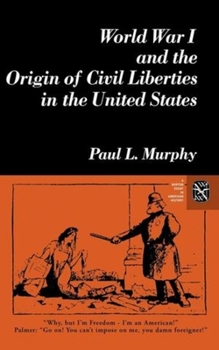World War I and the Origin of Civil Liberties in the United States
(Part of the Norton Essays in American History Series)
Select Format
Select Condition 
Book Overview
Clarifies the reasons why the first attempt to secure meaningful civil liberties occurred in the World War I era.
Format:Paperback
Language:English
ISBN:0393950123
ISBN13:9780393950120
Release Date:December 1979
Publisher:W. W. Norton & Company
Length:288 Pages
Weight:0.70 lbs.
Dimensions:0.7" x 5.3" x 7.9"
Customer Reviews
1 rating
Good introduction to the civil liberties issue in the First World War
Published by Thriftbooks.com User , 18 years ago
In spite of entering the First World War pledging to make the world "safe for democracy," the administration of President Woodrow Wilson pursued the war at home with measures that dramatically restricted the rights of American citizens. Speech was curtailed, people were arrested without due process, and homes and businesses were searched without warrants, all in the name of the wartime emergency. Paul Murphy makes this campaign and the response it engendered the subject of this book, an excellent short study of the war's impact on civil liberties. With America's entry into the war in April 1917, the Wilson administration secured the passage of emergency wartime measures designed to control domestic opposition to the war effort. These laws were onerous, but were presented as temporary measures necessary to achieve victory. In many ways this embodied what Murphy sees as the traditional view of civil liberties that predominated in the late 19th and early 20th centuries, which argued that only those who had "proved" that they could use their civil liberties in the right way deserved to have them protected - a view that excluded minorities, aliens, and people advocating radical ideas. That the federal government was now being employed to restrain civil liberties, Murphy argues, reflected the Progressivism of the era, as paternalistic attitudes which before the war had sought to use the federal government to address social problems now viewed it as a means of ensuring support for the war. Murphy goes on to depict the enforcement of the laws, an enforcement that was often characterized by zealousness. Though many officials used discretion in implementing the measures, others treated it as a tool for harassing groups seen as unpatriotic or unrepresentative of American values. Often private groups such as American Protective League joined in, taking it upon themselves to conduct investigations and intimidate citizens. Nor was the judiciary immune from such passions, as judges often favored prosecutors in wartime cases and instructed juries to demonstrate their patriotism by handing down guilty verdicts. Though some people were dismayed by such oppressive action and the American Union Against Militarism created a Civil Liberties Bureau (the forerunner to today's American Civil Liberties Union) in an attempt to stem these abuses, their efforts ran counter to the public climate of the time, which did not turn against the measures until after the war. With this book, Murphy has provided an excellent short overview of his topic. Written with clarity and a solid command of the legal aspects of his subject, he sheds considerable light on an often-overlooked aspect of America's past. Though some of Murphy's broader historical interpretations seem open to question and the text is peppered with mistakes (such as his continual labeling of William Gibbs McAdoo as Wilson's Secretary of State instead of Treasury), the book itself is a fine introduction





